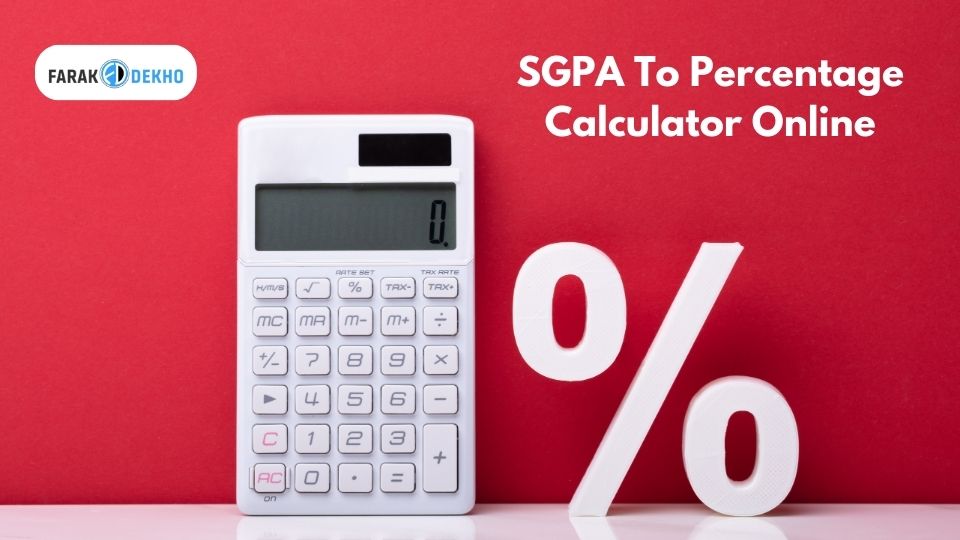SGPA To Percentage Calculator Online
SGPA to Percentage Calculator
Do you need clarification on your SGPA and its relationship to percentage grades? You’re not alone! This comprehensive guide will demystify SGPA, walk you through calculations, and reveal insider tips for academic success. Let’s dive in!
Understanding SGPA
SGPA, or Semester Grade Point Average, is like a report card for your entire semester condensed into one number. It’s a way for educational institutions to measure your academic performance over a single semester.
The History of SGPA
The concept of SGPA emerged in the mid-20th century as part of a broader shift towards standardized grading systems. It was introduced to provide a more nuanced evaluation of student performance compared to the traditional percentage system.
Fun fact: Did you know that the GPA system was first introduced in the United States at Yale University in 1783? However, it took almost two centuries for it to evolve into the SGPA system we know today!
How To Calculate SGPA Into Percentage
Here’s a step-by-step guide to calculating your SGPA:
- For each subject, multiply the credit points by the grade points.
- Add up all these products.
- Divide the sum by the total number of credit points.
The formula looks like this:
SGPA = (Sum of [Credit Points × Grade Points for each subject]) / Total Credit Points
Let’s look at a real-world example:
| Subject | Credit Points | Grade Points |
|---|---|---|
| Math | 4 | 8 |
| Science | 3 | 9 |
| English | 3 | 7 |
| History | 2 | 8 |
To calculate SGPA, you can add the formula below the table or inside a separate block:
Formula:
SGPA = ((4×8) + (3×9) + (3×7) + (2×8)) / (4+3+3+2) = 8.08SGPA Calculator To Percentage Conversion
Now, here’s where it gets interesting! Converting SGPA to percentage isn’t as straightforward as many think. The commonly used formula is:
Percentage = (SGPA × 10) – 7.5
However, here’s an insider tip: This formula is an approximation and can vary slightly between institutions. For the most accurate conversion, always check with your specific college or university.
- Using our example SGPA of 8.08:
- 8.08 × 10 = 80.8
- 80.8 – 7.5 = 73.3%
So, an SGPA of 8.08 is approximately equivalent to 73.3%!
How To Use CGPA to Percentage Calculator
Real-World SGPA Scenarios
Let’s explore some real-life scenarios to understand SGPA better:
- The Consistent Performer: Sarah maintained an SGPA of 8.5 throughout her degree. Her percentage equivalents were consistently around 77.5%, making her a strong candidate for postgraduate programs.
- The Improver: Rahul started with an SGPA of 6.0 (52.5%) in his first semester but improved to 8.0 (72.5%) by his final semester. This upward trend impressed potential employers during interviews.
- The Specialist: Priya excelled in her core subjects, scoring a 9.5 SGPA (87.5%) in those but had a lower overall SGPA of 8.0 (72.5%). She used this to her advantage when applying for specialized roles.
Institution-Specific Variations
Here’s something many students need to realize: The SGPA system can vary between institutions! For example:
- Some universities use a 10-point scale, while others use a 4-point scale.
- The weightage given to different types of assessments (exams, projects, etc.) can differ.
- Some institutions have a different formula for converting SGPA to percentage.
Always check your institution’s specific guidelines to understand your SGPA accurately.
The Importance of SGPA in Your Academic Journey
Your SGPA is more than just a number. Here’s why it matters:
- Scholarship Opportunities: Many scholarships have minimum SGPA requirements.
- Internship and Job Applications: Employers often use SGPA as an initial screening criterion.
- Higher Education: Postgraduate programs usually have SGPA cutoffs for applications.
- Personal Growth: Tracking your SGPA helps you understand your academic progress and areas for improvement.
Strategies to Improve Your SGPA
Want to boost your SGPA? Try these proven strategies:
- Prioritize High-Credit Courses: Focus extra energy on courses with more credit points.
- Consistent Study Habits: Develop a regular study schedule instead of cramming before exams.
- Seek Help Early: Don’t hesitate to ask professors or tutors for help if you’re struggling.
- Participate Actively: Engage in class discussions and activities to better understand the material.
- Practice Past Papers: Familiarize yourself with the exam format and common question types.
Remember, improving your SGPA is a marathon, not a sprint. Be patient and consistent in your efforts!
SGPA vs. CGPA: Understanding the Difference
While SGPA measures your performance in a single semester, CGPA (Cumulative Grade Point Average) reflects your overall academic performance across all semesters.
Here’s how to calculate CGPA:
- CGPA = (Sum of all SGPAs) / (Number of semesters)
- For example, if your SGPAs for four semesters were 7.5, 8.0, 8.5, and 8.0:
- CGPA = (7.5 + 8.0 + 8.5 + 8.0) / 4 = 8.0
International Equivalents of SGPA
If you’re considering studying abroad, understanding how SGPA translates internationally can be crucial:
- USA: Uses GPA on a 4.0 scale. Roughly, an SGPA of 8.0 (out of 10) is equivalent to a 3.2 GPA.
- UK: Uses a class system. An SGPA of 8.0-10.0 is equivalent to a First Class degree.
- Germany: Uses a 1-5 scale, where one is the best. An SGPA of 8.0 would be approximately 2.0 on the German scale.
Remember, these are approximations. Always check with the specific institution for accurate conversions.
Common Misconceptions About SGPA
Let’s debunk some myths:
- “SGPA directly translates to percentage.” Not quite! As we’ve seen, there’s a specific formula for conversion.
- “A low SGPA in one semester ruins your chances.” False! Many institutions and employers look at overall trends and improvements.
- “SGPA is the only factor that matters.” While important, holistic development, extracurricular activities, and practical skills also play crucial roles in your career.
Farakdekho’s SGPA Calculator: Your Academic Ally
At Farakdekho, we understand the challenges students face when calculating SGPA. That’s why we’ve developed a user-friendly SGPA Percentage Calculator to make it easier for you.
- Instant Calculations: Input your SGPA and get your percentage immediately.
- Mobile Accessibility: Use our calculator on the go with our mobile app.
- Institution-Specific Options: Choose your institution for more accurate conversions.
- Historical Tracking: Save your results to track your progress over time.
Whether you’re a student aspiring for higher education or researching the best online MBA colleges in India, our tool helps you convert your SGPA into an accurate percentage in seconds.
This feature is especially useful for those looking to meet specific academic requirements for top UGC-approved online MBA programs. Trust Farakdekho to simplify your academic journey!
Frequently Asked Questions
A: No, in the standard 10-point scale system, ten is the maximum SGPA possible.
A: Typically, SGPA is calculated at the end of each semester.
A: Yes, by performing better in subsequent semesters and improving your CGPA.
A: While it’s widely used, some institutions may use different systems. Always check with your specific institution.
A: The reverse formula is: SGPA = (Percentage + 7.5) / 10
Remember, at Farakdekho, we’re committed to helping you navigate your academic journey with ease. Use our tools, resources, and this guide to take control of your grades and unlock your full potential!
Have you got more questions? Feel free to reach out to our expert team at Farakdekho. Your academic success is our priority!

Lovepreet Sachdeva is an SEO Specialist with extensive experience in helping businesses improve their online presence. He is dedicated to providing top-notch SEO services and personalized strategies to boost your website’s performance. Contact him today for professional SEO assistance.

